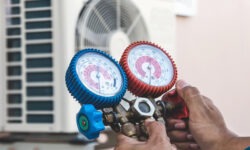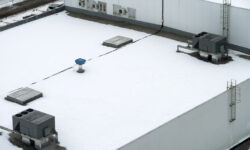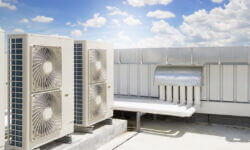Regular HVAC maintenance in your commercial building is a responsibility you owe to your tenants and employees, but you owe it to yourself, as well. In fact, properly maintained systems can provide up to 25 years of dependable performance. Commercial-grade HVAC equipment such as air conditioners, furnaces, heat pumps, and boilers are very expensive to replace. On the other hand, regular preventative maintenance is relatively inexpensive. From reducing utility costs to improving your air quality, professional HVAC maintenance is financially advantageous and time-saving.
Read more →As winter comes around, there will be numerous things to do to prepare your commercial building. Getting your HVAC systems ready is one of them, and going with the professionals can help you in more ways than you might think.
Read more →As stated by the CDC, HVAC systems can be a big source of indoor pollutants. Improperly maintained systems can lead to the introduction of microbes into an indoor air system. Improper operation and maintenance of HVAC systems can seriously impact a building’s indoor environmental quality (IEQ) and be the cause of other detrimental issues. A Severn Group service contract is a cost-efficient, convenient way to ensure a building’s HVAC system is properly maintained. The following five reasons explain why a service contract is the right choice.
Read more →According to the EPA, heating and cooling systems account for 40%-50% of the energy consumption in the typical hotel room. The type of HVAC system you choose for your hotel rooms will not only affect your energy bills but also contribute significantly to the comfort of your guests.
Read more →If you’re a commercial property owner or if you’re a businessperson who leases commercial property, you have to deal with maintaining the building’s HVAC system. Who should pay for this regular and necessary maintenance – the property owner or the tenant?
Read more →After being partially or fully closed for the past year, school buildings across the country are opening up full-time for students in all grades. What can your school do to keep kids healthy and safe – not just from COVID-19, but from all manner of airborne germs? It’s all about working with your HVAC system.
Read more →Sunny days, especially during the hot summer months, can cause your building’s HVAC system to work overtime. What can you do to keep your utility bills down when temperatures rise?
Read more →Energy remains one of the major overheads for commercial properties and buildings. According to the U.S. Energy Information Administration (EIA) in 2019, space heating accounted for about 38% of delivered energy in the building sector. Therefore, regularly reviewing your building’s HVAC efficiency can help save on costs and reduce operational overhead. Not to mention, investing in energy-efficient HVAC will also help fight climate change, create a sustainable future, and improve the building’s IAQ.
Read more →Heating, Ventilating, and Air-Conditioning (HVAC) systems are what we know. HVAC systems control the temperature, air quality, and humidity in buildings large and small. Yet, not all HVAC systems are the same, especially when it comes to commercial buildings. That is why we want to talk about the basics. Things you need to know to help you understand the complexity behind commercial HVAC systems. While it might seem as simple as keeping the indoors cool in the summer and warm in the winter, there is so much more to it. So, let’s talk about understanding commercial buildings’ HVAC systems.
Read more →Many large commercial buildings use rooftop systems, also called packaged HVAC systems. While common, not all smaller commercial buildings use them. Some still use split systems, which tend to be more common with residential buildings. Essentially the difference between split systems and a rooftop system is in the name. Half the unit is inside, half of it is outside. Packaged systems are all in one unit. In commercial buildings, they are referred to as rooftop systems because that is typically where you find them.
Read more →









